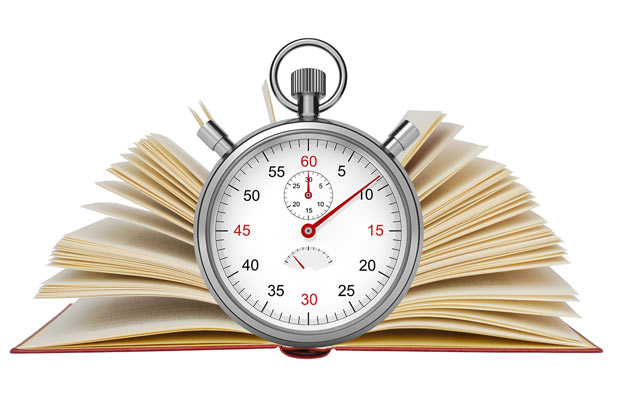The Rhythm for Reading blog
All posts tagged 'reading-fluency'
Virtuous spirals
1 October 2016Last month’s post focussed on the expressive aspect of reading fluency, drawing a comparison between the varying trajectories of a ball in a tennis match with the varying contours of sentences in a passage of text. The analogy served (npi) to emphasise the high degree of flexibility and poise required for fluent reading. However, in this post I want to stress the importance of the link between reading fluency and reading comprehension: skilled readers who are able to read with fluency and understanding are swept up into a virtuous spiral, which contributes to a lifelong-love of reading and learning.
There is little point in being able to read quickly, accurately or fluently, if readers cannot process the meaning of a passage. Without the automatic integration of decoding and semantic processing that skilled readers enjoy, weaker readers cannot experience the intrinsically rewarding aspects of reading and benefit from the same virtuous spiral. A wide range of cultural factors such as maternal education, gender, SES and changes in digital technology may disadvantage some children, but it is important to maintain the high expectation that every child can become a skilled reader. Training weak readers to identify in a text the visual match to the key words in a comprehension question and then retrieve the whole sentence without necessarily understanding the text for example, can only serve to degrade their experience of reading and learning.
Readers with poor comprehension skills are limited by their recognition of printed words as ‘signs of language’ that convey sound (phonological processing). Skilled readers on the other hand, recognise words and phrases as ‘signs of real or imagined life’ that convey meaning (phonological and semantic processing, as well as detecting grammatical structure).
Interestingly, the integration of decoding with semantic processing occurs without deliberate effort on the part of skilled readers. Weak readers, however need help with integrating decoding, syntactic and semantic processing. This can be achieved by improving their sensitivity to rhythm in a matter of weeks. Rhythmic awareness is integral to the way we breath, eat, laugh, speak and move and can be extended to reading too. Read more here.

Considering reading fluency
1 September 2016 
Earlier this year, we started to measure our impact in a slightly different way. Many teachers and head teachers have remarked on the improvement in their pupils’ reading fluency, so it seemed important to try to capture what has been happening. Of course, there are different ways to define and to measure reading fluency, but here is a snapshot of what we found when using two types of assessment. Luke (not his real name) aged 11, attends an outstanding school in the East of England and according to the school’s tracking data in December 2015, his reading age was 8 years, 3 months, which was broadly in line with our baseline reading rate score using the Neale Analysis of Reading Ability (NARA II).
Luke has a SEND diagnosis, and he participated in the Rhythm for Reading sessions with unwavering commitment. Although he was quite a bit younger, he quickly became the leader of a group of adolescent boys all of whom struggled with attainment across the curriculum. Luke’s teacher observed all of the sessions. She was amazed by his confident approach and said that this was a side of him that the staff at school had not seen before.
The ten sessions of the programme ended in March 2016. Luke had gained 7 months in reading fluency (AAB)* and 35 months in sentence comprehension (AAB). His scores on the NARA II showed a gain of 13 months in accuracy, 8 months in comprehension and 38 months in rate of reading.
Luke’s teacher observed his classwork and filled in a tick box survey, comparing his recent progress during the programme with his usual rate of progress. During the period from January to March 2016, his teacher observed that he’d made better progress than usual in using punctuation, understanding texts, participating in class and in his attitude towards reading.
In March, I asked Luke whether or not he’d noticed a change in his reading since we started the programme. He replied, “It’s helped me with my reading and my eye focussing and my concentrating.” When I asked him how that made him feel, his response was heartfelt,
It makes me feel better. It makes me want to read more. I never wanted to read. I never used to read. Now I love reading.
Hearing Luke read expressively and effortlessly on that day was wonderful, but to hear him proclaim his enjoyment of reading was such a privilege. I heard from his teacher at the end of June that all of the boys who had taken part had maintained their progress.
*You might be wondering what the AAB is. The Academic Achievement Battery (AAB), constructed by Melissa Messer, was published in 2014 by PAR. The AAB is suitable for children and adults (4 - 85 years) and offers 15 subtests in reading, writing, spelling and arithmetic. There are two similarities between the sentence comprehension test from the AAB and reading comprehension as assessed by the Neale Analysis of Reading Ability (2nd British Edition), published by GL Assessment. Both tests assess comprehension while the pupil has the text in front of them. In other words, they are not being assessed on their capacity to remember the text. Like the NARA II, illustrations are an integral part of the AAB test, increasing the appeal of the format for reluctant readers with fragile word recognition skills. The AAB measures reading fluency as the number of correct words read in one minute. The obvious advantage of this approach is that it is quick and easy to use. However, it is not designed to capture the positive changes in expression and engagement with reading that we have become accustomed to hearing. More on this next time!
Practising Poetry - the importance of rhythm for detecting grammatical structures
1 April 2016There are so many overlaps between poetry and music. People ask me frequently why it is that reciting poetry seems to help children, particularly those finding aspects of reading fluency and comprehension somewhat challenging.
Practising poetry by heart, particularly in group teaching is a massively experiential process. The feeling of the sounds in the movement of the face, the jaw and the tongue are dance-like sequences and enjoyed for their bold sensations, which in terms of conveying their mood, colourful tones and timbres are musical in every way. In terms of how it feels, reciting poetry is just like practising a musical instrument; indeed practising poetry through the congruence of movement, sounds and patterns is a deep and enriched form of language learning that we all can enjoy, having mastered this first as infants acquiring our mother-tongue (Nazzi et al., 1998).
If you read aloud or recite Lewis Carroll’s Jabberwocky, it’s easy to evoke the atmosphere and moods created by movement, rhythm and sound, even though the words of the poem are meaningless. Behind the expressive tones of the nonsense words, there’s a robust rhythmical structure and fascinatingly, researchers have found that we respond to the poem as if to a projected illusion of grammatical structure (Bonhage et al., 2015). The importance of rhythmical patterns is that they cast beams of expectation, helping to guide and focus our attention, enabling us to fully anticipate and enjoy all the more, the likely flow of the sounds and the colourful moods of the poem.
The usefulness of rhyme, so popular in children’s literature, is that it offers a fun and playfully supportive, highly accessible and very basic form of phonological awareness. Hearing the rhyming feature in words is a massive anchor for children who may arrive at school struggling to discern word boundaries in a stream of speech. This example of rhyme is from, ‘One fish, two fish, red fish, blue fish by Dr Seuss (1960):
This one has a little star. This one has a little car. Say! what a lot of fish there are.
Rhyming words are also invaluable for those children who come to school with a clearer grasp of language. Children are stimulated by rhymes, because rather than simply following the language of the poem, they are more deliberately focussing their attention in order to predict the placing of the rhyming word at the end of the line or phrase. For these reasons it is not surprising that highly rhythmically aware children are more likely to become good readers (Tierney and Kraus, 2013) – they arrive at school able to anticipate and enjoy the structure of rhythmic patterns in language. Similarly, children who may require a reading intervention thrive when practising poetry because the explicit rhythmical structure and shorter phrase lengths support their attention, helping them to perceive the meaningful elements of language more easily.
In the Rhythm for Reading programme, we takes this principle further still, by providing rhythm-based reading tasks that give the children a chance to build their awareness of rhythmic patterns very rapidly. The sessions are a highly condensed extraction from traditional musical training. Building a strong response to rhythmical patterns, children develop and sustain their attention across increasingly complex musical phrases. Their awareness of rhythm transfers into their reading development after only a few ten-minute sessions.
If you liked this blog post, you are invited to subscribe to my weekly updates for interesting insights into rhythm, language and learning.
Bonhage, Corinna E., et al. (2015) “Combined eye tracking and fMRI reveals neural basis of linguistic predictions during sentence comprehension.” Cortex 68, 33-45
Dr Seuss (1960) One fish two fish red fish blue fish, Random House
Nazzi, T., Bertoncini, J. and Mehler, J. (1998). Language discrimination by newborns: Towards an understanding of the role of rhythm, Journal of Experimental Psychology: Human Perception and Performance, 24, 756-766
Tierney A, Kraus N (2013) Music training for the development of reading skills. Prog Brain Res 207:209 –241

Visiting the library for the very first time
1 December 2015Apart from our group teaching sessions, perhaps the most important part of what we do is to hear children read individually for twenty minutes at the beginning and end of the Rhythm for Reading programme. Through this process we measure their progress, provide useful data for the school and also extend our own expertise on reading development and reading intervention.
In a recent follow-up session, a Year 5 student had discovered to her great relief that she could at last understand the message carried by the words that she read. Her reading reading fluency and comprehension had transformed. With great excitement she explained that she planned to go with her cousin to visit the library in the centre of the city where she lived.
Her bold plan moved and inspired me to visit the Norfolk Children’s Book Centre to put together a list of books for children who have discovered the joy of reading and are preparing to visit their nearest library for the first time. The Norfolk Children’s Book Centre houses some 80,000 children’s books. As dolphins, dinosaurs and gladiators feature prominently in our resources and are extremely popular with the children, they provided an obvious starting point for our search for these particular books.
Davis, N. (2011, illus. Brita Granstrom) Dolphin Baby. Walker Books ISBN 9781406344011
Features such as the rhythmic swing of the language, subtle use of alliteration and the careful exploration of a dolphin’s sound world make this a book that strongly resonates with the musical resources of our reading programme.
Davis, N. (2013, illus. Annabel Wright) Manatee Baby. Walker Books ISBN 9781406340884
Inhabiting the mind of Manuela, we discover how it feels to paddle along the Amazon and to kill a Manatee, a protected mammal. The rhythmic flow of the language is powerful, steering the reader through lavish descriptive writing and moments of buoyant, lively interaction between the characters.
King Smith, D. (2005) Dinosaur Trouble. Penguin ISBN 9780141318455
This enjoyable story is perfect for Rhythm for Reading children who have started to read longer words with confidence and are highly motivated to develop their vocabulary.
Chambers, C. (2015, illus. Emmanuel Certissier) Dinosaur Hunters. Dorling Kindersley IBSN 9780241182598
This is an innovative story for older readers and is refreshingly free from cultural stereotypes. It is about three global citizens from England, Japan and Brazil, who meet through a time-travel App. The descriptive language supplies finely grained details both of historical settings and digital devices.
Burgan, M. (2015) Life as a Gladiator Raintree ISBN 9781474706773
This interactive history adventure allows the reader to construct his / her own storyline using metadata to link to any of three different historical perspectives. It is fast-paced, yet packed with fascinating detail and classical scholarship.
For a copy of the full list please email enquiries@rhythmforreading.com
Starting a new school year: Mixed ability group teaching
1 September 2015The energy of a new school year is incredibly positive and also very demanding. Some students will begin the term refreshed, starting the year with high aspirations, new stationery in their new school bags, whereas others will have anxiety or feel angry that the work ahead of them will be even more difficult to understand than it was the year before. Many will look forward to seeing classmates again, but socially less well-adjusted children, will dread a return to taunts and jibes and loneliness.
Many will be beginning the new school year with the best of intentions, wanting to please teachers, trying to organise themselves with greater success than before and to contribute in lessons. Some will lack motivation, and for complex reasons, will continue to struggle, as despite everyone’s best efforts, the school system does not really help them.
I am frequently inspired by children who do not understand what they read, but trust that with more reading practice, their experience of reading will become more rewarding. Unfortunately, practising reading as a decoding skill is not going to help them to achieve fluency and comprehension. Unless word recognition skills are integrated with the child’s speech and understanding of language, for example, through a reading intervention, a profound disconnection between these processes will persist.
Equally inspiring for me, are the teachers and classroom practitioners who are faced with the enormous task of teaching children with extraordinarily wide-ranging attitudes to learning. I see wonderful group teaching in classrooms week after week, year after year. We really should celebrate that we have such a high calibre workforce in our schools.
There are new case studies on our website, illustrating how the Rhythm for Reading programme continues to support teachers in resolving the difficulties that children experience with reading fluency and comprehension. Click the link to read more.
The Power of Music – Reflections
15 February 2015The Power of Music - a research synthesis of the impact of actively making music on the intellectual, social and personal development of children and young people, by internationally renowned Professor Susan Hallam MBE, University College London, Institute of Education was published at the end of January 2015. The review brings together more than 600 scholarly publications, which provide compelling evidence of the positive effect of music on literacy, numeracy, personal and social skills to support the argument for the inclusion of music in the education of every child and young person.
Music, more than any other discipline consists of ways of doing things (techniques and methods) and ways of being (empathy, intention, style etc). Perhaps, the most important of these is how to listen well. Children, immersed in their family and home environment from pre-birth to school age, have learned nearly everything they know about their language and culture through listening. A high quality musical education develops listening far beyond the everyday level by enhancing and deepening communication; it also refines physical coordination skills far beyond what can be achieved through sport. The unique combination of these elements contributes immensely to pupil well-being and to learning.
The value of a high quality musical education in primary school, consisting of the integration of listening skills with singing, physical coordination and notation reading skills cannot be overstated. As musicians we have a huge responsibility to equip primary teachers with great tools, and training of the highest quality so that they feel confident, secure and empowered in this exciting and creative role. Through the Rhythm for Reading programme, with access to our group teaching methods and with all the tools and training that we have developed, all primary teachers can deliver a high quality musical education, bring the power of music into their classrooms and witness the profoundly vibrant effects of music education on reading fluency, listening skills and much more.
A few words on the subject of rhythm
12 October 2014
Whether chanting slogans, learning times tables, conjugating verbs, memorising telephone numbers or reciting poetry, the chances are that most people have at some point relied on their sense of rhythm to memorise units of information. The regular beat underpinning a rhythmic pattern generates a stable framework, pulling discrete units of information together into chunks that are more easily remembered. The regular beat is as predictable (and cyclical) as the sound of waves breaking on the shore. However, the presence of rhythm in our everyday lives is relatively subtle, particularly where language is concerned. This may be because our perception of time is predominantly linear in terms of having a past, present and future or in terms of structure, a beginning, middle and end. We make linear arrangements of words on a page and are usually fixated on the end point – debating how effective and how satisfactory the resolution might be.
Both the process of reading in order to learn and the sense of reading with ease and fluency and understanding that we experience when reading for pleasure are little understood by researchers, but the role of rhythm is key, as the Rhythm for Reading blog will explain in the posts that follow.
